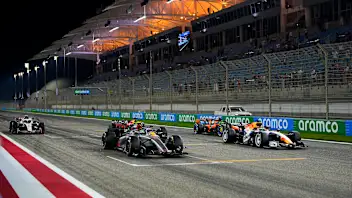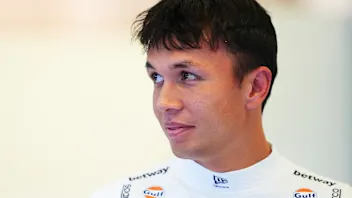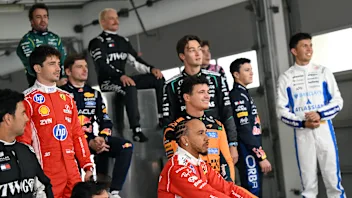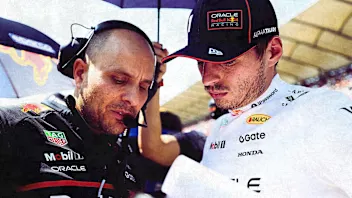50 years on - John Surtees on his unique bike-car double
John Surtees headed into the 1964 Formula One season finale in Mexico locked in a three-way fight for the title.
Engine issues sent him plummeting down the race order and threatened an early exit, but Surtees fought back and, as fellow Britons Graham Hill and Jim Clark hit trouble in dramatic fashion, emerged triumphant as the first, and to date only, person to have won world championships on both two and four wheels.
But what does the man himself think of the magnitude of his achievement? What was his mentality going into that showdown against two of the most celebrated F1 champions? And when did he realise he was on the brink of something historic? On the eve of the 50th anniversary of his unprecedented feat, we spoke to Surtees to find out…
"Get the race right and the rest comes with it - that has always been my attitude in life. And so I didn't have a sense of the occasion heading into Mexico, or even during the race. It was others who had pointed out that I could become the first man to do the double - and it was only after the race, when I saw the beaming faces of my team, that it struck me, a sense of what I had done. And yes, looking back, it's satisfying. But the most important thing - the most important part of my racing - was simply that I loved what I was doing..."
On October 25, John Surtees will celebrate the 50th anniversary of his Formula One world championship crown with Ferrari - except that, with typical modesty, he admits that 'celebrate' may not be entirely the right word. "I might have a glass of Mumm champagne," he laughs, "but that will probably be about it."
It's a throwaway line, but in many ways epitomises Surtees' character: humble and self-effacing, yet also supremely talented and fiercely independent. Such traits explain why, in his view, his 1964 crown is "just one of those things"; and why, rather than the six Grand Prix victories or the historic double, "the races I mainly remember are the ones I didn't win - the ones that annoy me."
Surtees had never intended to make the crossover from motorcycling to F1 racing, and yet he achieved the transition with startling success. He hadn't led the world championship at any point during the 1964 season, but emerged with the crown. And though he had never targeted a place in history, he ended up scaling a peak that none since has come close to matching. Indeed, it's possible his achievement will remain forever unparalleled.
"I can honestly say that I didn't go into 1964 - or any season in fact - thinking about titles or anything like that," Surtees recalls. "The most important thing in a racer's life is always the next race - that's the attitude you need to get things done, which was particularly true in those days when you had to sort the cars out on track, during race weekends, because you didn't have other resources.
"In fact, in 1964 Ferrari didn't have a dedicated F1 programme as such - it fitted in with their prototype programme, which was the first priority. We didn't start the season well either - there had been debate about the engine we should use, and I think for political reasons the eight cylinder was agreed upon. Climax also had a V8 and were well established with it; Ferrari thought they could catch up using a Bosch direct injection system, but it proved something of a challenge. And all the while you had the prototypes, so it wasn't until Le Mans was finished that we started to properly concentrate on F1."
After the opening four races, Surtees had claimed one podium - finishing second to Lotus's Jim Clark at Zandvoort - and retired three times. A second podium came at Brands Hatch - he was a distant third to Clark and BRM's Graham Hill - but even so he slipped further back in the championship, falling 20 points behind Clark and 16 behind Hill.
The turning point came just a week later, however, at a non-championship race at Solitude, Germany. With Bosch located nearby, Ferrari were able to trial a number of new arrangements to try and counter their main issue with the V8 - throttle control and driveability in mid-range. The resulting improvements meant Surtees surged into a clear lead early on, and even though he was eventually reeled in by Clark as the circuit dried, the main message was clear: the team was making progress. Crucially, that translated across into the world championship.
At the next Grand Prix, held on the fearsome Nurburgring circuit, Surtees scored his first win of the year, more than a minute clear of Hill. He led in the next round at Zeltweg, only to retire with suspension failure, but fought back to win at Monza and then finish second to Hill at Watkins Glen, where he again spent time in the lead. Heading into the final round in Mexico City, Surtees was just five points behind Hill in the championship, while Clark was four points further back, but still in contention.
"Mexico was always going to be the biggest problem for us - we knew very well that we would have issues with getting the fuel mixture right. At that altitude, and with corners that created a lot of g-forces, flat engines had a problem with oil surge and consumption. So we tried to make the mixture leaner, and in practice the engine blew up. We debated switching to the 12 cylinder [which team mate Lorenzo Bandini was using] but we were concerned about reliability.
"We put a fresh engine in for the race, but at the start it was running on anything but eight cylinders. I finished the first lap in 13th [from fourth on the grid], and was dropping back, while the engine was just about boiling. But as it got stinking hot, it finally came onto eight cylinders - it was so lean that it only started working at that temperature. After that, I was off…"
Surtees surged up the order, eventually closing onto the tail of Hill, who was battling with Bandini. Hill attempted a move into the hairpin, but Bandini defended and the pair made contact. Surtees slipped by, as Hill limped to the garage with damage, his chances of a points finish in tatters.
"I suppose the incident was partly my fault," Surtees recalls, "in that by arriving on the scene, there was another car to factor in. There were all sorts of lines and defensive racing that meant they weren't necessarily on the right part of the road."
Still, Surtees was poised to lose out: Clark had built a comfortable lead, and the nine points on offer meant the Lotus driver was set to become champion for the second time. With a handful of laps remaining, however, his Lotus began leaking oil. Less than two laps from the flag, its engine seized. Clark was out, and Surtees - now second - took over the virtual lead of the championship. The rest, as they say, is history.
Does Surtees ever reflect upon that moment? Has he ever considered, for example, that while 12 men have walked on the moon, only one has been able to walk the path he completed in Mexico 50 years ago?
"Well this year it has been brought up more, of course. It was satisfying at the time, and also at this stage of my life, to be able to look back and say that I have that sort of position. But it never drove me. I never went into it for history or fortune: I did it because I loved coming together with a piece of machinery. That was the way it was.
"In fact I only got involved with cars by accident. It had been suggested to me before, but I always considered myself a motorbike rider. But then MV Augusta restricted my bike programme - I wasn't allowed to ride my own bikes on the British circuits because the Italian media said it was me winning, not MV."
Surtees' record on bikes, incidentally, is phenomenal. He won more than two thirds of the 300-plus races he entered, and finished roughly half the remaining races on the podium - a record he laughingly admits 'isn't bad'.
"I thought there was nothing to stop me from doing some car races, and in fact my first race came about through being introduced to Ken Tyrrell, who promptly told me he had already entered me for Goodwood and spoken to the RAC about my licence. What did I have to say? 'Why not!' [Surtees would set pole, and finish a close second to Clark, in the race].
"So I raced both bikes and cars during 1960, but by the end of the year one or two new challenges came up, and I was aware that turning them down would mean just repeating what I was already doing. Colin Chapman offered me the number-one position at Lotus, and while that went wrong - that's another story - it helped me decide it was time for a new challenge. That's how it came about."
So how does Surtees rate his career, his achievements? What was it like to triumph against the likes of Clark and Hill?
"Rivals are always combinations of man and machine - and Jimmy and Lotus were formidable," he reflects. "It was probably the heyday for Hill and BRM. And then you had Jack Brabham - I finished second to Jack in my first ever Grand Prix - and Dan Gurney, who is often overlooked: he was a damn good driver and a real enthusiast. They were a special group.
"So yes, I thoroughly enjoyed it, and I take satisfaction from what I achieved. There are still regrets, things I would have liked to get right, things I was perhaps a bit hasty on. I was sad, for example, about leading Le Mans for over 20 hours and not being able to win it. But ultimately I have been very fortunate to have led a life where I was doing something I loved. And, as I said to [seven-time MotoGP champion] Valentino Rossi recently, 'Okay, you or someone else might match me and do the double, but I was always the first'.
"That is something that can never be taken away - something that I will always have..."
For more on John Surtees' career, see the Hall of Fame.
Next Up
Related Articles
 BettingHow to take a break from gambling when you need it
BettingHow to take a break from gambling when you need it Albon admits Williams are ‘not where we want to be’
Albon admits Williams are ‘not where we want to be’  Our writers share their predictions for the 2026 season
Our writers share their predictions for the 2026 season Alpine performance is ‘tricky to tell’ – Colapinto
Alpine performance is ‘tricky to tell’ – Colapinto Watch the ultimate guide to the 2026 cars
Watch the ultimate guide to the 2026 cars UnlockedThe key qualities a driver needs in a race engineer
UnlockedThe key qualities a driver needs in a race engineer